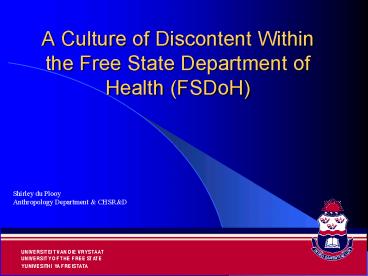A Culture of Discontent Within the Free State Department of Health FSDoH
1 / 18
Title: A Culture of Discontent Within the Free State Department of Health FSDoH
1
A Culture of Discontent Within the Free State
Department of Health (FSDoH)
Shirley du Plooy Anthropology Department CHSRD
2
Background
- PN in PHC facilities
- Emotional psychological distress
- Negative implications for service delivery
- Necessity to monitor staff wellbeing
- Feedback sessions from such a project
3
Methodology
- Six feedback workshops in 2006
- Five district management
- One FSDoH top management
- 173 attendees
- Purpose Communicate findings opportunity
to respond - Detailed notes observations by researchers
4
Results Discussion
- Valuable insights into burnout compassion
fatigue reported by PNs in FS - Overt latent matters
5
Primary findings
- Meaningful relevant retention strategies
- Work re-design measures
- Instilling institutional trust
- Non-clinical training skills development
- Action
6
1. Meaningful relevant retention strategies
- Workload overload exacerbated by
- Number of programmes
- Patients seeking health care interventions
- Comprehensive range of activities
- However
- Remuneration promotion
- Competitive packages
- Entry-level remuneration rank promotion
- Promotion career development
- Administrative managerial positions
7
continued Meaningful relevant retention
strategies
- Moonlighting
- Staff shortages a given
- Implementing new programmes
- Unfilled posts
- Heavy reliance on volunteers
- cant see an increase in training and a
concerted effort from the Department of Health to
address this issue - Need to revisit the budget
8
2. Work re-design measures
- Outsourcing of tasks
- More non-nursing posts
- Nurses used to plug up the holes in the system
- Supervisors overload staff with tasks
- nurses should be recognised as nurses how
can they do a proper job, if they are doing so
much? - Devise creative ways to make unbearable tasks
more bearable - Prioritising tasks
- Clinic-attending behaviour
9
3. Instilling institutional trust
- Performance appraisal system
- Standardised performance measures
- Budget constraints
- Jealousy
- Communication, support staff wellness
- Good at district level
- Poorer between district local area levels
- e.g. the ART PHC case
10
continued Instilling institutional trust
- No wellness programme
- Psychologists mental health of patients
- EAP fixed at provincial level
- Little faith in EAP personnel
- Confidentiality cant be guaranteed
- Own resourcefulness in seeking counselling or
therapy - Employer read as unsympathetic, therefore not
trusted - Actively engage in reducing absenteeism
11
continued Instilling institutional trust
- Broken promises
- Rural scarce skills allowances
- Only in two districts it is still on the
table - Devolution process
- Lost travel allowances accumulated leave
contribute more to medical aid insurance
policies - the Department of Health broke promises
before, why will they not do the same now. Why
should they be believed or trusted now?
12
continued Instilling institutional trust
- Lack of consultation in decision-making
- When considered nothing comes of the decisions,
or the opposite of those decisions (made by
someone else) is implemented
13
4. Non-clinical training skills development
- Current curriculum not adequate
- Needs revision
- Comprehensive practical vs. theoretical training
- Orientation programme needed
- Mentoring (problem already overloaded)
- Delegation of accountability assertiveness
- Person-directed training
- e.g. family matters personal finances
14
continued Non-clinical training skills
development
- Management-related training
- e.g. financial management, meeting procedures
training in the programme they are managing - Coping skills
- Promote management of workload, stress, fatigue
burnout - Minor attempts to relieve stress burnout
- Once-off workshops sports-days
- when they nurses return to work, they must do
double the work to catch up, and that increases
the stress they experience
15
5. Action
- Top management must
- Acknowledge the problem
- Take decisions
- Support lower levels
- Middle management feel
- Dont have the resources or the influence
- District facility level actively engaged
- action needs to follow, stop passing the
buck, as this has a negative trickle-down
effect
16
Conclusion
- Reasons for decision-making paralysis
- No HOD for 2 years
- High turnover at top-management levels
- Acting Heads acting managers
- Lack commitment to make decisions take action
- Organisational structure culture
- District differences not pronounced
- Well-resourced (staff, incentives equipment)
- Begs an answer
- Larger culture of discontent
17
Recommendations
- Need to instil adopt
- Higher levels of organisational moral
- Perceived institutional justice
- Sense of responsibility pride
- Symptomatic relief wellness
18
Acknowledgments
- Sincere gratitude to the following institutions
and individuals - The Free State Department of Health
- The researchers and fieldworkers of the CHSRD
- This project was made possible by
- the Foreign Assistance Agencies of
- AusAID
- DFID
- USAID
- UNDP
- JEAPP
- IDRC
- MRC

